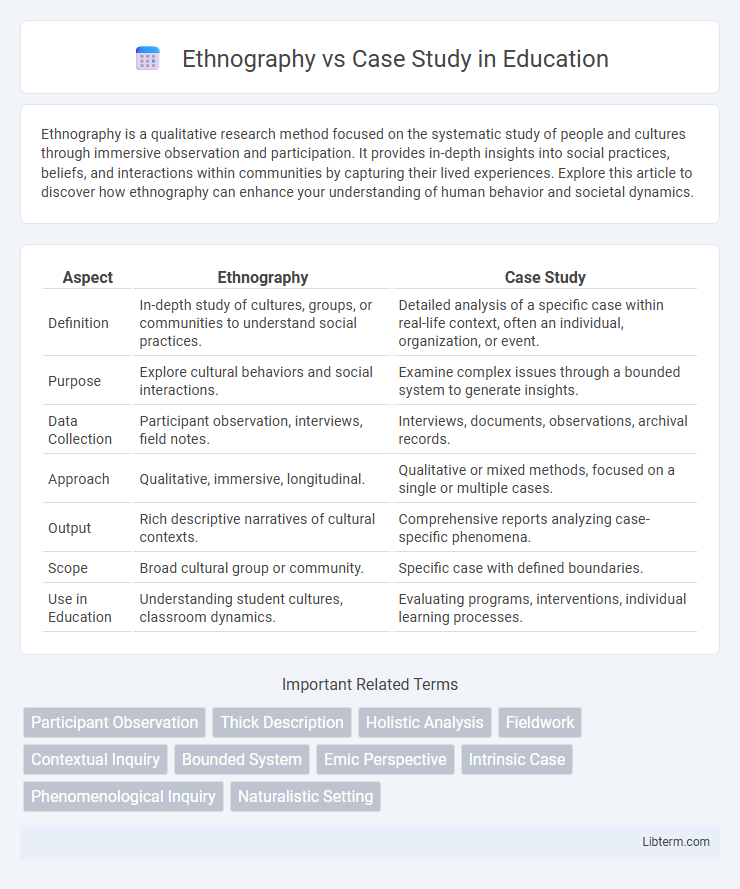Ethnography is a qualitative research method focused on the systematic study of people and cultures through immersive observation and participation. It provides in-depth insights into social practices, beliefs, and interactions within communities by capturing their lived experiences. Explore this article to discover how ethnography can enhance your understanding of human behavior and societal dynamics.
Table of Comparison
| Aspect | Ethnography | Case Study |
|---|---|---|
| Definition | In-depth study of cultures, groups, or communities to understand social practices. | Detailed analysis of a specific case within real-life context, often an individual, organization, or event. |
| Purpose | Explore cultural behaviors and social interactions. | Examine complex issues through a bounded system to generate insights. |
| Data Collection | Participant observation, interviews, field notes. | Interviews, documents, observations, archival records. |
| Approach | Qualitative, immersive, longitudinal. | Qualitative or mixed methods, focused on a single or multiple cases. |
| Output | Rich descriptive narratives of cultural contexts. | Comprehensive reports analyzing case-specific phenomena. |
| Scope | Broad cultural group or community. | Specific case with defined boundaries. |
| Use in Education | Understanding student cultures, classroom dynamics. | Evaluating programs, interventions, individual learning processes. |
Understanding Ethnography
Ethnography emphasizes immersive fieldwork to explore cultural practices, beliefs, and social interactions within a community, providing rich, contextualized insights often gathered through participant observation and interviews. This qualitative methodology aims to understand the lived experiences and meanings that individuals attribute to their social world, capturing the complexities of behavior in natural settings. Unlike case studies, which focus on an in-depth examination of a specific entity or event, ethnography prioritizes the broader cultural context and collective patterns over time.
Defining Case Study Research
Case study research systematically explores a bounded system, such as an individual, group, or organization, through in-depth data collection methods like interviews, observations, and document analysis to capture complex phenomena within their real-life context. It differs from ethnography by focusing on a specific case rather than studying broader cultural patterns over extended periods. This method enables researchers to generate rich, contextualized understanding and develop theory grounded in detailed empirical evidence.
Key Differences Between Ethnography and Case Study
Ethnography primarily involves immersive fieldwork to explore cultures and social behaviors over an extended period, emphasizing participant observation and qualitative data. Case study research focuses on an in-depth analysis of a specific individual, group, organization, or event, utilizing multiple data sources such as interviews, documents, and archival records. The key difference lies in ethnography's broad cultural context versus case study's targeted examination of a bounded system or phenomenon.
Research Objectives and Questions
Ethnography primarily aims to explore cultural phenomena and social interactions within natural settings by answering questions about behaviors, beliefs, and group dynamics. Case studies focus on an in-depth understanding of a particular individual, group, organization, or event, addressing specific research questions related to context, processes, and outcomes. Research objectives in ethnography emphasize capturing rich, holistic insights into cultural practices, while case study objectives target detailed analysis and explanation of complex, bounded cases.
Data Collection Methods
Ethnography employs immersive participant observation and in-depth interviews to collect rich, contextual data within cultural or social groups over an extended period. Case studies utilize multiple data sources such as interviews, documents, archival records, and direct observations to provide a comprehensive understanding of a particular individual, organization, or event. Both methods prioritize qualitative data but differ in scope, with ethnography focusing on cultural phenomena and case studies emphasizing specific instances or cases.
Role of the Researcher
In ethnography, the researcher plays an immersive role, actively participating in the cultural or social setting to gain deep, contextual insights. In contrast, case study research positions the researcher as an observer who systematically analyzes a bounded system or case, often from multiple data sources, without extensive direct involvement. This distinction shapes the data collection methods and the depth of interpretive analysis in each approach.
Duration and Scope of Study
Ethnography typically involves long-term immersion, often spanning months to years, to deeply understand cultural practices and social interactions within a community. Case studies usually have a shorter duration, ranging from weeks to months, focusing on an in-depth analysis of a specific individual, organization, or event. The scope of ethnography is broader, encompassing holistic cultural contexts, while case studies concentrate narrowly on particular cases or phenomena.
Analysis and Interpretation Techniques
Ethnography employs immersive observation and thematic coding to uncover cultural patterns and participant meanings, emphasizing contextual understanding through thick description. Case study analysis integrates multiple data sources such as interviews, documents, and artifacts, using triangulation and pattern matching to construct a comprehensive narrative of the specific instance. Both techniques rely on iterative data examination but differ in scope, with ethnography prioritizing cultural context and case studies focusing on detailed insights within bounded systems.
Strengths and Limitations
Ethnography excels in providing in-depth cultural insights and understanding social interactions within natural settings, but its time-consuming nature and potential researcher bias can limit generalizability. Case studies offer detailed exploration of complex phenomena within real-life contexts, allowing for multiple data sources and rich contextual analysis, though they may lack broad applicability and risk overemphasis on a single instance. Both methodologies contribute valuable qualitative data, yet researchers must carefully consider their specific research goals and constraints when choosing between them.
Choosing the Right Approach
Choosing the right research approach depends on the study's goals and context. Ethnography is ideal for exploring cultural practices and social interactions within communities through immersive observation, providing deep contextual understanding. Case studies suit detailed investigation of specific individuals, groups, or events, offering rich insights into complex phenomena and allowing for multiple data sources.
Ethnography Infographic

 libterm.com
libterm.com